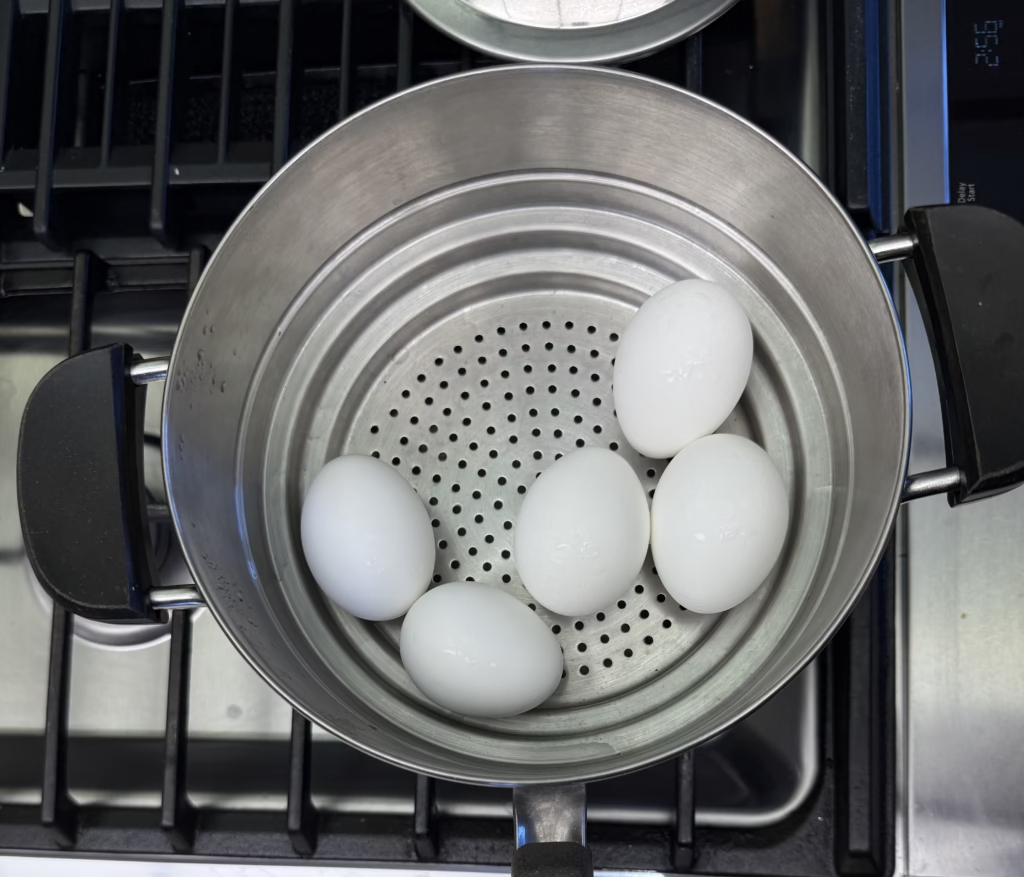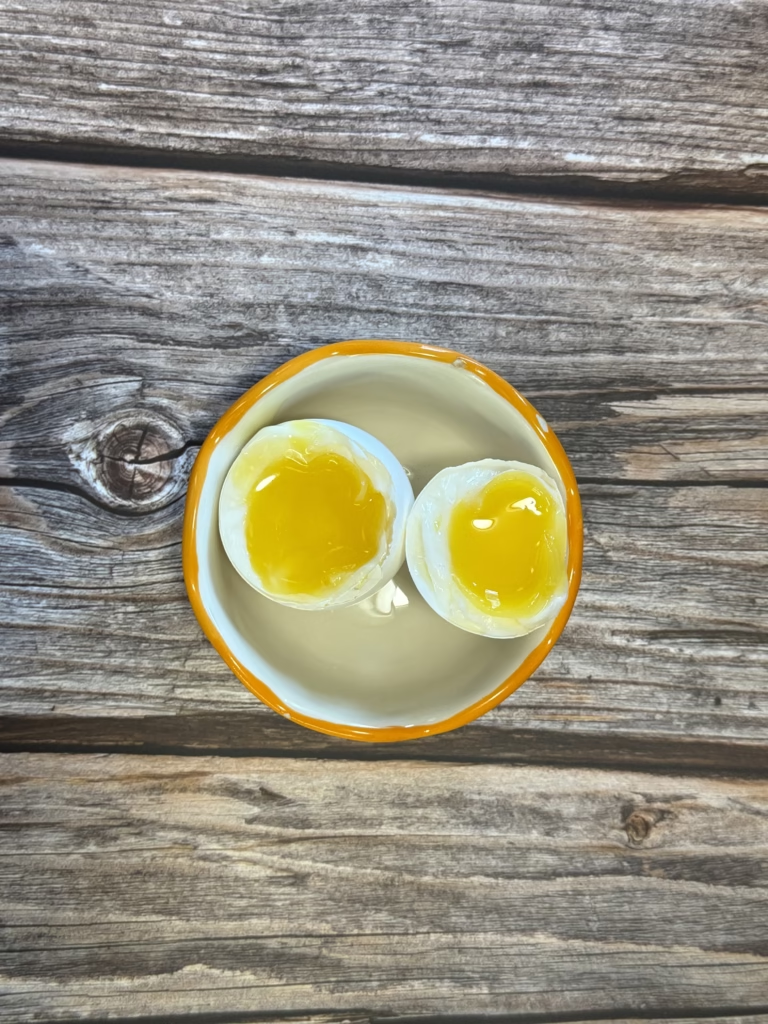Perfectly cooked Steamed Eggs

Perfectly cooked steamed eggs are simple and not to be feared. I know a lot of people avoid hard or soft boiled eggs because they feel it’s a guessing game and you never know what you will end up with until you crack or peel your egg. While this used to be somewhat true, I have found a technique that works pretty much without fail. Steaming results are so consistent that I have not boiled an egg in years. I am not sure why I haven’t written about this technique sooner, anyway, better late than never.
Eggs are one of the most versatile and nutritious foods on the planet. Whether you prefer them soft-boiled with a gooey yolk or hard-boiled with a firm center or somewhere in between, cooking them to perfection can sometimes feel like a challenge. Enter steaming – a method that ensures perfectly cooked eggs every time, with minimal fuss and maximum consistency.

You do not need any special equipment in order to have perfectly cooked steamed eggs. All you really need is a pot with a lid and a trivet or steaming rack that will fit inside. The goal is to keep the eggs above the water in the pot. I have a pot that came with a dedicated steamer insert, so that’s what I use but a regular pot will work as long as you have a trivet or steamer insert. The image below is a 6 minute soft cooked steamed egg.

Why Steaming Is the Secret to Perfect Eggs
While boiling eggs is the traditional method, steaming offers several distinct advantages:
- Gentle Cooking: Steaming eggs means they are cooked more gently, reducing the risk of overcooking and ensuring that the whites are tender while the yolks remain creamy or firm, depending on your preference.
- Easier to Peel: Steamed eggs tend to peel more easily than boiled eggs. The steam helps create a small air pocket between the shell and the egg white, making it simpler to remove the shell without damaging the egg. A presentable egg is always a bonus especially if you are using them for something like devilled eggs. No more eggs with chunks of the whites missing.
- Consistent Results: Steaming allows for more predictable outcomes. With boiled eggs, slight changes in water temperature or timing can lead to unpredictable results. Steaming, however, ensures a more consistent outcome every time.
- No Water Immersion: Steaming doesn’t require you to submerge your eggs in water, which means you don’t have to worry about overcooking them if you step away for a minute.
How to Steam Eggs to Perfection
What You’ll Need:
- A steamer basket, rack, or colander (or a regular pot with a lid and a trivet)
- A pot with a lid
- Water
- Fresh eggs (room temperature or slightly chilled)
Instructions:
- Prepare Your Steamer: Add about an inch or two of water to the pot, ensuring that the water doesn’t touch the eggs. Place a steamer basket, colander, or trivet in the pot. The goal is to steam, not boil, so the eggs should be above the water level.
- Heat the Water: Cover the pot with a lid and bring the water to a boil over medium-high heat. Once the water is boiling, reduce the heat to a simmer.
- Place the Eggs in the Steamer: Carefully place the eggs into the steamer basket or colander. Make sure they are not overcrowded to ensure even cooking.
- Cover and Steam: Cover the pot with a lid and let the eggs steam for the following times:
- Soft-Boiled Eggs (Runny Yolk): Steam for 6–7 minutes.
- Medium-Boiled Eggs (Slightly Set Yolk): Steam for 8–9 minutes.
- Hard-Boiled Eggs (Firm Yolk): Steam for 11–12 minutes.
- Cool the Eggs: After the desired cooking time, immediately transfer the eggs to an ice bath or run them under cold water for several minutes to stop the cooking process. This also helps with peeling.
- Peel and Enjoy: Gently tap the egg on a hard surface, roll it to loosen the shell, and peel. The shell should come off easily, leaving behind a perfectly cooked egg.
Tips for Perfectly cooked steamed eggs Every Time
- Start with Room Temperature Eggs: Eggs that are closer to room temperature are less likely to crack when placed in the steamer. If you’re using eggs straight from the fridge, you might want to let them sit at room temperature for 10–15 minutes before steaming.
- Don’t Overcrowd the Pot: If you’re cooking a large batch of eggs, it’s better to do it in batches rather than cramming too many into the steamer. Overcrowding can cause uneven cooking.
- Adjust Time Based on Egg Size: The times listed above are for large eggs. If you’re using smaller or larger eggs, you may need to adjust the steaming time by a minute or two. Trial and error until you achieve your perfect doneness.
- Use a Timer: Accuracy is key when steaming eggs, especially for soft and medium-boiled eggs. A timer will ensure you don’t miss that perfect moment when the yolk is just right.
Perfectly cooked Steamed Eggs Recipe Ideas
Now that you’ve mastered steaming eggs, here are a few ideas on how to enjoy your perfectly cooked eggs:
- Classic Soft-Boiled Eggs: Serve with toast soldiers for dipping or atop a fresh salad with a tangy vinaigrette.
- Egg Salad: Use hard-boiled eggs for a creamy egg salad with a little mustard, mayo, and fresh herbs, or ass a topper for the perfect Spinach salad.
- Ramen: Soft-boiled eggs are a delicious addition to a steaming bowl of ramen.
- Avocado Toast: Top a slice of whole-grain toast with mashed avocado, a soft-boiled egg, and a sprinkle of red pepper flakes. They’re all the rage at the moment.
- Curry: Hard-boiled eggs make a great addition to vegetable curries or served as a protein-rich topping for rice-based dishes.
Steaming eggs is a simple method for achieving perfectly cooked eggs every time. Whether you’re after a soft, runny yolk or a firm, fully cooked center, steaming gives you consistent results with ease. Plus, it’s a method that allows you to focus on other tasks in the kitchen without having to worry about water boiling over or eggs cracking.
Next time you need a batch of hard or soft eggs, skip the boiling and give steaming a try—you’ll be amazed at how easy and foolproof it is!
